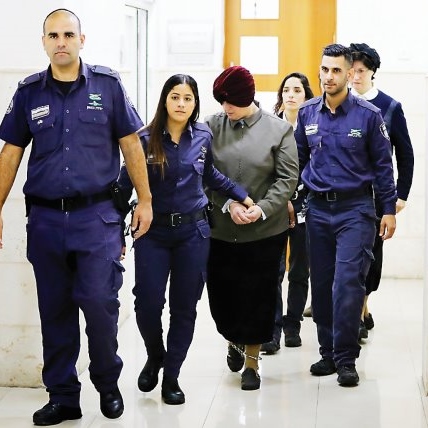click to dowload our latest edition
CLICK HERE TO SUBSCRIBE TO OUR NEWSLETTER


Published
5 years agoon
By
adminSAM SOKOL
Short of celebrating the arrest of an abuser, local victims’ rights advocates took the authorities to task.
Shana Aaronson, the head of the Israeli branch of the New York-based Jewish Community Watch organisation, took to social media, describing in a Facebook post how authorities and the Beit Shemesh community ignored a disturbing pattern of behaviour by the predator in question, who had previously served time for abuse.
“Shortly after he was released” – three years ago, after his first detention – “I started getting the phone calls,” she wrote.
“Numerous community members calling to share that he’s hanging out with kids – a lot – and they are very concerned. I encouraged them to warn the parents. But, you know, it’s awkward. No one ever wants to be the killjoy calling up a neighbour to share the lashon hara (negative speech) that the kindly young man who’s taken their kid under his wing is a convicted child molester. Then the next wave of phone calls started. He’s volunteering at local organisations, and using his status there to pick up kids.”
According to Aaronson, the young man even called her to volunteer at Jewish Community Watch, asking to “mentor children who had been sexually abused”.
The police, she told the Jewish Telegraphic Agency, knew he was dangerous, but were restrained from acting because nobody with first-hand knowledge of the abuse had been willing to come forward. Israel, unlike the United States, does not keep a registry of sex offenders.
As a result, Aaronson wrote, for two years “it seems a community’s worth of people has been watching while a child molester strategically groom[ed] and prey[ed] on his victims”.
Israel has experienced an overall increase in the reporting of incidents dating back to the beginning of the decade. But several recent incidents here have highlighted what advocates like Aaronson describe as a systemic failure of both government and civil society to deal adequately with the issue of child sexual abuse.
In May, the state comptroller’s annual report revealed that 60% of Israelis jailed for sexual crimes ended up being released without undergoing any sort of therapeutic treatment to prevent recidivism.
The report also found that there was increased monitoring by police of offenders after their release. And, while there were more investigations into incidents of paedophilia than in previous years, seven out of 10 cases ended up being shut down without an indictment.
Some advocates believe that part of the problem may be ingrained in Israel’s political culture. Tough slander laws here make it hard for victims to accuse their abusers publicly. Meanwhile, advocates have said that sentencing guidelines are inadequate. There has also been a strong taboo against reporting abuse among members of haredi orthodox communities.
According to a recent investigation by Israel’s Channel 13, Deputy Health Minister Yaakov Litzman was alleged to have improperly intervened to aid at least 10 sex offenders from Israel’s haredi, or ultra-orthodox, community. This comes after earlier reports that Litzman, who himself is haredi, had been questioned by police over suspicions that he had attempted to prevent the extradition of accused child molester Malka Leifer to Australia.
The extradition battle over Leifer, who fled Melbourne in 2008 with the help of figures in the local haredi community after allegations against her surfaced, has dragged on for several years, frustrating her accusers.
It’s worrying when such behaviour is “coming from the top”, said Manny Waks, the founder of the victims’ rights organisation Kol v’Oz. “To have Litzman setting such an example, that is the core of the issue here because that shows that there is a systemic failure in leadership.”
While he felt that he could not comment on specific allegations against Litzman, American activist Rabbi Yakov Horowitz said there was definitely a pattern to how such cases are handled in Israel, especially when it comes to extraditing accused abusers such as Leifer and Avrohom Mondrowitz, who has been living openly in Israel for years. Mondrowitz is a Gur Hasid and accused serial molester who fled Brooklyn for Israel in the 1980s. Tablet reported that some believe that local authorities in New York declined to have him extradited because of haredi political pressure.
Horowitz is being sued for defamation in an Israeli court for warning people against convicted sex offender Yona Weinberg, whom he has publicly asserted constitutes a danger to the community. Weinberg also disputes Horowitz’s statement that he is wanted on further charges in the United States.
Horowitz recalled an op-ed from a decade ago in which the victims’ advocate wrote that, “Word on the street is that there are powerful people backing Mondrowitz. Having him successfully avoid extradition will confirm that suspicion in the minds of many. It will also reinforce a horrible message to the public at large and more specifically to abuse victims – unfortunately the one that is prevalent – that the blood of innocent children can be washed away if the molester knows the right people.”
Ten years later, little has changed, he said.
“There seems to be a really large thumb pushing down on the side of the scale where the abusers are,” Horowitz said.
As Ha’aretz reported in April, some advocates have gone so far as to describe Israel as a “haven” for Jews accused of crimes of a sexual nature.
